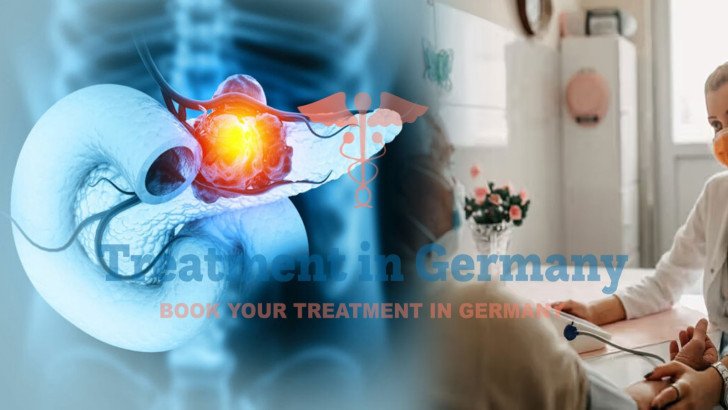
Stage 4 pancreatic cancer occurs when pancreatic cancer spreads beyond the pancreas to distant organs, affecting approximately 50-60% of patients at diagnosis.
Germany stands as a global leader in advanced oncology, emphasizing the critical role of nutritional support for stage 4 pancreatic cancer. Stage 4 pancreatic cancer, characterized by widespread metastasis (often to the liver, lungs, or peritoneum), presents significant challenges due to its aggressive nature and impact on patient health. Patients benefit from enhanced disease management, improved survival rates, and personalized nutrition plans through innovative nutritional support strategies.
Stage 4 pancreatic cancer occurs when pancreatic cancer spreads beyond the pancreas to distant organs, affecting approximately 50-60% of patients at diagnosis. This advanced stage is driven by factors such as smoking, chronic pancreatitis, obesity, and genetic mutations (e.g., BRCA2). The disease severely disrupts digestive health, leading to malnutrition, weight loss, and cachexia due to impaired pancreatic enzyme production and tumor-related inflammation. German oncology centers prioritize nutritional support to counteract these effects, enhancing patient strength and supporting treatment tolerance.
Recognizing stage 4 pancreatic cancer symptoms and their nutritional implications is vital for effective disease management. These symptoms often exacerbate malnutrition:
Nutritional challenges include reduced digestive enzyme activity, poor nutrient absorption, and increased metabolic demand. German healthcare providers address these through comprehensive nutritional assessments and tailored interventions.
Enhancing Nutritional Support for Stage 4 Pancreatic Cancer
Nutritional support for stage 4 pancreatic cancer is essential to maintain patient health and improve treatment outcomes. Key strategies include:
German oncology centers customize these nutritional support plans, integrating them with oncological treatments to enhance patient resilience.
Clinical Evidence Guiding Nutritional Support for Stage 4 Pancreatic Cancer
Germany’s clinical evidence in 2025 provides a robust framework for nutritional support, supported by ongoing research.
Survival and Health Outcomes
A 2024 study from the University Hospital Hamburg-Eppendorf demonstrated that patients receiving nutritional support with PERT and high-protein diets achieved a median overall survival (OS) of 7.2 months, compared to 5.4 months without support. Improved nutritional status also reduced treatment-related complications by 30%.
Progression and Monitoring Approaches
German oncologists use advanced monitoring approaches:
Emerging Research and Trials
German clinical trials advance nutritional support:
Why Germany Excels in Nutritional Support for Stage 4 Pancreatic Cancer
Germany offers unmatched expertise for pancreatic cancer patients:
Risk Factors and Preventive Measures for Stage 4 Pancreatic Cancer
Preventing progression to stage 4 supports nutritional health. Key risk factors include:
German specialists recommend regular screening, balanced diets, and early intervention to reduce risk.
Comprehensive Multidisciplinary Cancer Nutrition
Germany’s multidisciplinary cancer nutrition integrates:
This approach optimizes patient outcomes.
Post-Treatment Care and Enhancing Quality of Life
Post-treatment support includes:
Challenges and Future Directions
Challenges include severe malnutrition and treatment side effects. German researchers address these through:
Future nutritional advancements promise improved efficacy.
Conclusion
Germany’s optimization of nutritional support for stage 4 pancreatic cancer offers hope through enhanced disease management, prolonged survival, and integrated care approaches. With multidisciplinary cancer nutrition and innovative research, German oncology centers deliver superior quality of life and health outcomes, solidifying their leadership in pancreatic cancer care.
Frequently Asked Questions
What are the primary symptoms of stage 4 pancreatic cancer affecting nutrition in 2025?
Symptoms include abdominal pain, jaundice, unexplained weight loss, fatigue, nausea, and loss of appetite, necessitating nutritional support through PERT or dietary changes.
How does nutritional support for stage 4 pancreatic cancer differ from earlier stages?
Unlike earlier stages focusing on maintenance, stage 4 requires intensive nutritional support like enteral feeding or PERT to combat malnutrition and cachexia, as emphasized by German clinical strategies.
What diagnostic methods assess nutritional needs in stage 4 pancreatic cancer in Germany?
Germany uses blood tests, BMI assessments, albumin levels, and nutritional screenings to evaluate health status, ensuring precise support planning.
Are there specific clinical trials in Germany focusing on nutritional support for stage 4 pancreatic cancer?
Yes, trials like NUTRI-PAN and Digi-Nutrition explore omega-3 supplements and digital tools, enhancing survival rates and treatment tolerance for stage 4 pancreatic cancer.
What follow-up care is provided after nutritional support for stage 4 pancreatic cancer in Germany?
Care includes ongoing surveillance with weight checks and blood tests, rehabilitation for fatigue, and emotional wellness support, ensuring sustained quality of life.
How does Germany compare to the UK or US in nutritional support for stage 4 pancreatic cancer?
Germany excels with advanced nutrition facilities, access to cutting-edge trials, expert multidisciplinary teams, and integrated care, outperforming many international peers.
Can early nutrition intervention prevent progression to stage 4 pancreatic cancer?
Early nutritional support and treatment of pancreatic cancer can reduce progression risk by 10-20%, supported by German preventive programs and dietary guidance.
Does Germany support international stage 4 pancreatic cancer patients with nutritional needs?
Yes, hospitals in Germany provide language support, travel assistance, and mental health programs to ensure comprehensive nutritional support for global patients.
What are the most promising nutritional strategies for stage 4 pancreatic cancer in Germany?
PERT, high-protein diets, enteral nutrition, and omega-3 supplements are advancing efficacy, promising better health outcomes and treatment tolerance.
How do patients experience the benefits of nutritional support compared to standard care?
Patients report reduced malnutrition, improved energy levels, and enhanced quality of life with nutritional support, as demonstrated in German care programs, compared to the limitations of basic diets.
For more information or a free consultation, visit our contact us page.
Kindly complete the form below, and our dedicated team will reach out to you promptly. We look forward to connecting with you soon!
Trierer Straße, 56072 Koblenz, Germany
.webp)
.webp)
 (1).webp)
 (1).webp)

.webp)
.webp)
 (1).webp)
 (1).webp)
